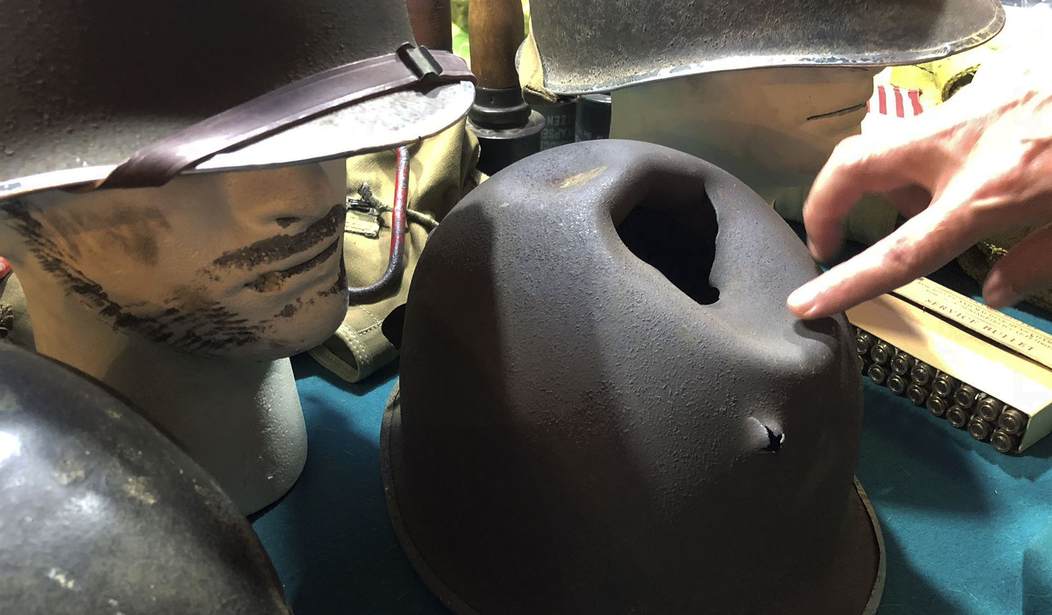I remember my great uncle Harry walking with a limp. I eventually asked my grandfather — one of Harry’s four older brothers — why he “walked funny.” My grandfather told me this story, probably several times. I hope I get it correct.
1943
My family is from Detroit. Long ago and unlike today, Canadians and Americans could cross the Ambassador Bridge without getting pulled over, searched, or incurring an alien abduction probing.
FACT-O-RAMA! Detroit is the only major American city north of the Canadian border. Despite growing up in the Motor City, I once got this question wrong while playing “Trivial Pursuit.” I also bombed the next geography question, “Name the only state that ends in the letter K.” At that time, I was living in New York.
Various members of my family routinely worked in Canada while living in the United States and vice versa, as there weren’t laws to prevent them from doing so. Back then, this just wasn’t an issue.
My Uncle Harry turned 18 years old in 1943. He was living in Detroit and dating a woman named Peggy who lived across the river in Windsor, ONT.
The war had been raging and Uncle Harry wanted to do his part. He went to the U.S. Army recruiting office to volunteer. The soldier told him he would be sent to Louisiana for basic training. One of the soldiers joked that Louisiana, unlike Detroit, was a “bug-infested hellhole in the summer.” He added, “Have fun!”
We Detroiters can handle snow (and carjackings), but bugs and heat seemed a bit much to my Uncle Harry. He had a date that night with his girl Peggy and, on his way to her house, stopped at the Canadian Army recruiter to see what they had to say. After all, the southernmost and hottest part of Canada was Windsor, and there aren’t any bugs there big enough to scare a human.
The Canadian recruiter told Harry he would spend his basic training days roughly 25 miles up the road. This would allow him to see Peggy and dodge the Louisiana sun and the large, carnivorous insects. Uncle Harry joined the Canadian Army. He packed what they told him to pack and showed up for basic training.
His first day started in a room full of recruits, many of them Americans, filling out forms. At one point, the recruits were told to stand at attention. “Repeat after me…,” they were instructed.
Harry repeated what they told him to. Then a Canadian soldier bellowed, “If you are American, put your hands down. Do not repeat the pledge to the Canadian government, as you are not Canadians.” Harry shut up.
June 6, 1944
Harry had been in the army for less than a year. He was sent to England, where he trained for beach landings and waited for the invasion everyone knew was coming.
He didn’t have to wait long.
Harry and his Bren gun landed in Normandy days after the initial D-day invasion. His unit was rushed to the front.
FACT-O-RAMA! A Bren gun is a British-made light machine gun with a bipod.
Harry’s first time under fire almost killed him. He had never heard of a hedgerow but found himself running through them with bullets flying everywhere. The noise of gunfire was so loud he couldn’t hear the sergeant bellowing orders, so he moved closer to him so he’d know what to do.
At one point, Harry’s unit was ordered up and forward, but he instantly tripped in a hedgerow. As he was falling forward, a sergeant grabbed his shirt and pulled him backward — just as, with a flash, German MG-43 rounds tore up the ground where he would have landed.
“Your uncle Harry told me again and again how scared he was right after that,” my grandfather recalled.
Uncle Harry killed German soldiers, but I wasn’t allowed to ask him how many. He saw his friend die and his body get mangled.
My grandfather said I couldn’t ask him about the war at all, but he would tell me the stories. He volunteered to fight but was told he couldn’t serve because a childhood injury had left him with a limp. He was extremely proud of his younger brother’s bravery and service. So am I.
Less than a month after trudging ashore in France, Harry’s war was over.
As his unit was moving through an open field, they drew fire from some hidden Germans. He heard the mortar coming in and it was louder than he had ever heard, which told him it was going to be close. He woke up to see his friends screaming and applying first aid to his legs. One of his friends was crying.
Harry’s legs were butchered. He was told he would die, but he didn’t. A field hospital doctor told him he would lose both of his legs, but he didn’t. He was told he’d never walk again, but he eventually did.
Doctors pulled a pile of shrapnel out of Harry’s legs, except for two pieces that were too close to an artery. He would carry those forever. Harry referred to the shrapnel as his “war souvenirs.”
FACT-O-RAMA! I saw Uncle Harry in a pair of shorts once. He must have had 12 scars I could see, and I knew there were more.
1946
The war was over and Uncle Harry was back in Detroit and learning to walk again while staying in his father’s home.
One day, a couple of “federal fellas” knocked on the door. They demanded to see his ID. Then they informed Harry that serving in the army of a foreign country is illegal and, thus, he was no longer an American citizen.
“But I didn’t say the Pledge of Allegiance to Canada,” he told them. It didn’t matter. The feds allowed him an hour to pack one suitcase. He could send for the rest.
They dropped Harry off in Windsor. He was roughly 21 years old and still injured.
QUESTION-O-RAMA! Will the American trans soldier fighting for Ukraine be allowed back into the U.S.A., or is this not a thing anymore?
Uncle Harry stayed in Canada and spent the rest of his life living in Windsor with his wife, my Aunt Peggy. He died in the 1990s of twelve brain tumors. He wondered if they were caused by the “war souvenirs” he carried for 45 years, but his doctor said he couldn’t answer that.
Related: ‘Rangers, Lead the Way!’: Army Ranger Heroes of D-Day
My Uncle Harry lost his American citizenship so he could spend more pre-war time with the woman he would eventually marry. He hated losing his citizenship but always said “Peg was worth the price.”
Today, I hoist a bourbon to Uncle Harry, the only “non-American” in my family to fight in WWII.









Join the conversation as a VIP Member